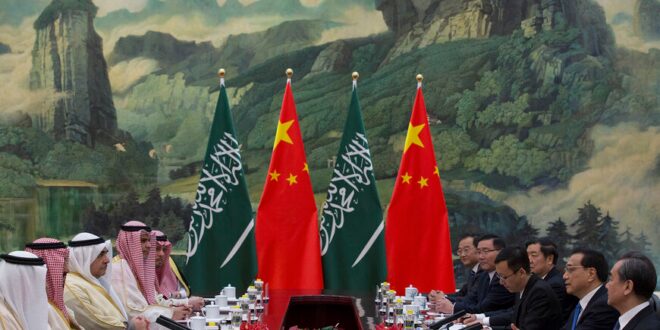As China hosts on Thursday the Saudi and Iranian foreign ministers in Beijing, the Gulf states have an opportunity to capitalize on its growing role.
In a world where superpowers vie for influence, the recent China-mediated reconciliation deal last month restoring diplomatic relations between Saudi Arabia and Iran, and Thursday’s meeting in Beijing between Saudi and Iranian top diplomats, underscores the region’s intricacies and offers a rare diplomatic boost.
This agreement may prove to be an important first step in reaching a conclusion over the Yemen war, ongoing between the Saudi coalition and the Iran-backed Houthis since 2014. Furthermore, it opens the door to greater integration with China, as it paves the way for both Saudi Arabia and Iran to potentially become part of the BRICS group, serving as a counterweight to the G7. This will also build on Saudi Arabia’s recent announcement that it is to join the Shanghai Cooperation Organization (SCO) as a “dialogue partner.”
As both the United States and China seek to strengthen their ties with the Gulf states, the two global powers offer equally valuable benefits, and the Gulf states’ interests appear to be best served by maintaining strong relationships with both while benefiting from their shared interests in regional stability and maritime security.
The United States has traditionally been the main security guarantor in the Gulf, providing crucial military support and partnerships. However, the 2003 invasion of Iraq and other events in recent years have raised questions about the steadfastness of this commitment. A lack of US action over the blockade of Qatar; the Sept. 14, 2019, drone attacks on Saudi oil facilities at Abqaiq and Khurais; and the exclusion of the Gulf Cooperation Council (GCC) from the Joint Comprehensive Plan of Action (JCPOA) negotiations with Iran all have resulted in doubts about the United States’ continued willingness to safeguard the Gulf states’ security interests.
In contrast, China’s growing economic power and diplomatic influence in the region cannot be ignored. With the recent restoration of diplomatic relations between Saudi Arabia and Iran, China has demonstrated its ability to broker deals and facilitate peace agreements. Beijing’s development-first and state-capitalist agenda offers an attractive alternative to the Gulf states; their growing diplomatic clout means that the Gulf states must balance the benefits offered by both the United States and China to achieve stability and prosperity. The potential inclusion of Saudi Arabia and Iran in the BRICS group, as both have now applied for, is a testament to Chinese influence and a shift toward a more multipolar world.
In this respect, it is worth observing Singapore’s approach, which emphasizes the importance of maintaining relations with both global powers. The way it achieves this is by not favoring one side over the other and emphasizing that it’s crucial for both China and the United States to decrease tensions and find areas of cooperation. Washington and Beijing share common interests in ensuring stability and maintaining maritime security in the Middle East. Disruptions in the region can have serious implications for the global economy and energy supplies. By recognizing such shared considerations, the Gulf states can leverage ties with both capitals to serve their strategic objectives.
A key area of concern for the United States is the growing influence of Chinese technology, particularly 5G infrastructure. The United States has been urging its allies to exclude Chinese corporations from their 5G networks due to security concerns. This approach may prove counterproductive, as many in the region perceive it as stifling development and forcing nations into a binary choice between the United States and China. For the Gulf states, technology and innovation are critical to their long-term development and economic diversification. By forcing them to choose between the United States or China, the United States risks alienating its regional partners, ultimately harming US strategic interests in the long run.
Rather than pressuring Gulf states into binary choices, the United States may choose to seek robust and collaborative relationships that acknowledge the advantages of cooperation. Consequently, the United States’ relationship with Gulf states could evolve beyond its emphasis on the defense sector.
Additionally, the United States could choose to engage in dialogue and cooperation with China on regional issues. By finding areas of common ground and working toward shared objectives, the United States and China can help create a more stable and prosperous region that benefits all parties involved.
As the Middle East adapts to a multipolar world, it is crucial for Gulf states to continue navigating their relationships skillfully. Recent diplomatic developments demonstrate that the region is changing, and traditional alliances of the past may no longer serve the interests of regional states. By cultivating strong relationships with both superpowers, Gulf states can maximize the benefits they receive from each and ensure their continued growth and stability.
Likewise, Gulf states can play a role in fostering cooperation between the United States and China. By using their influence and strategic position, they can encourage dialogue and collaboration on shared challenges and opportunities. This can help to mitigate tensions and create an environment conducive to joint initiatives that promote regional development, security and prosperity.
By recognizing the shared interests of both superpowers and fostering a spirit of cooperation and collaboration, Gulf states may be able to successfully navigate the complex and evolving geopolitical landscape, ensuring their continued growth, stability and security in an increasingly multipolar world. Embracing this multipolarity can also play a significant role in resolving longstanding conflicts such as the Yemen war and help to create a more stable and peaceful region.
 Eurasia Press & News
Eurasia Press & News




